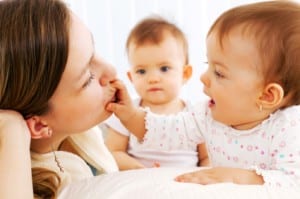
Demographer Ken R Smith of the University of Utah and his team also added that mother of twins usually have more children than expected, bear babies at short intervals for a longer time and are older at their last birth than other mothers.
The researcher however points out that the results are not because they have twins but because the women are in general healthier and have increased chances of delivering twins.
“Having twins will not make you stronger or healthier, but stronger, healthier women are more likely to have twins naturally,” says Shannen Robson, the study’s first author and a recent Ph.D. graduate in anthropology at the University of Utah.
What Smith also says is that the findings are contrary to the belief that women who bear twins naturally have to bear added strain during childbearing.
He explains, “The prevailing view is that the burden of childbearing on women is heavier when bearing twins. But we found the opposite: women who naturally bear twins in fact live longer and are actually more fertile.”
What was special about the research was that the data used came from the Utah Population Database, which is among the world’s most comprehensive computerized genealogies. The database includes information on 6.4 million people from the early 1800s to present.
From this database, the researchers studied 58,786 non-polygamous Utah women who were born between 1807 and 1899, lived to age 50 and married once after 1850 to husbands who were alive when their wives were 50. Of those, 4,603 were the mothers of twins and 54,183 gave birth only to one baby at a time.
Smith says about the relation between twin birth and health, “People are always interested in what affects how long we are going to live. It’s complicated. There are so many factors that contribute to longevity, health and aging.”
“This study has been able to identify – and it’s a fairly novel result – another important factor that contributes to health and longevity in later years, namely, that women bearing twins appear to be healthier,” Smith says. “That innate healthiness is contributing to their ability to have twins, and it is also contributing to their longevity.”
He also points out that the study is a broader view and they do realize that women having twins or triplets may have medical complications.
“Women having children are fundamentally young and healthy,” he adds. “So the risk of dying in childbirth is quite low. The women who have twins have a somewhat elevated risk of mortality over those [child-bearing] years, but the vast majority of those women reach age 50, and we’re able to observe that they have healthier lives.”
Earlier studies had shown that while having twins run in families, environmental factors such as mother’s health, and her age during pregnancy played an important role.
Smith said that while people today generally are conscious towards leading a healthy life, their genetic makeup too is responsible for their health and it is in this respect that they found that mother of twins are naturally healthier.
The group of women in the 1800s was specifically selected to study only natural births and not include the present day prevailing cases of artificial twin births.
“We’re saying that women who twin naturally have something that makes them healthier,” says Smith. “We are able to see that in these ancestral women because they had many children and had no fertility treatments. They have left a legacy through their descendants who may all share this desirable trait of being healthier.”
For women today “who have access to infertility treatment and who have twins – which isn’t uncommon – we simply don’t know how that will affect their health,” he adds. “We’re not encouraging women to actively seek having twins so they can live longer. It’s not a conclusion we can draw.”
The various results of the study were,
- For twinning moms born before 1870s the risk of dying before 50 was 7.6 percent lower than mother of single kids. For mother born between 1870s and 1899 the risk was lower by 3.3 percent.
- Women who had twins eventually had more children than expected. In the prior to 1870 group this average number of kids was more statistically by 1.9 and in the later period by 2.3 more children.
- For both the groups mothers of twins average two weeks shorter intervals between births than mothers of single children showing that they physically healthier than others.
- The period of reproduction or the reproductive span was larger for mother of twins. In the prior to 1870s group it was 18 years and four months for mother of twins and 18 months for mother of singletons. For the 1870-1899 group the span was 14 years and 11months for twinning mothers while 14 years for others.
- Mom of twins were older at the time of their last birth than mom of singletons. In the 1870s group the mothers had their birth 4.8 months later and in the 1870-1899 group they had their delivery 14 months later than single kid mothers.
- Julie Bowen Spends Mother’s Day With Her Boys
- Rare Conjoined Twins Who Share a Single Body Born in China
- Mariah Carey Reveals The Names Of Her Twins
- And Quints Make 8!






